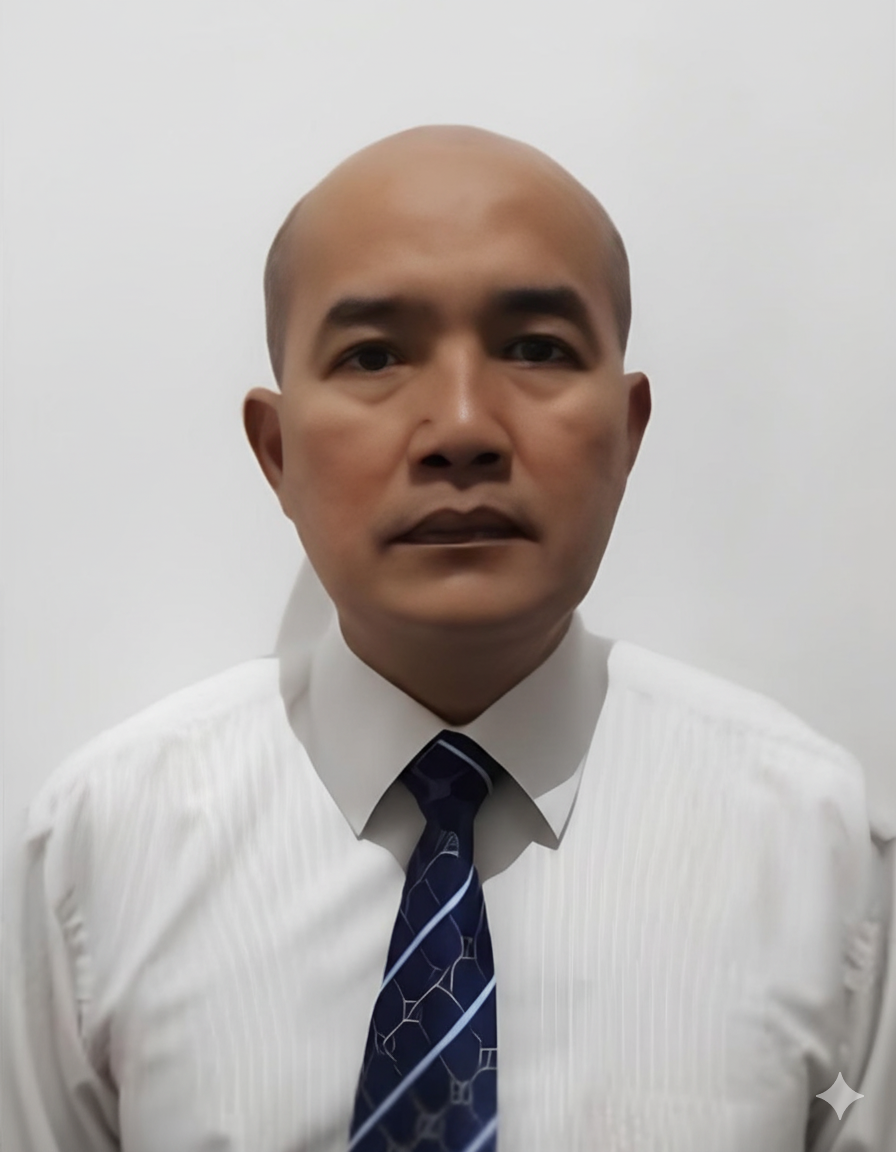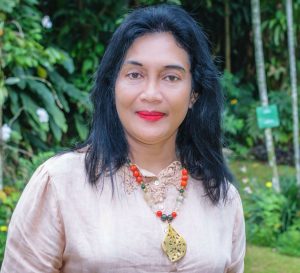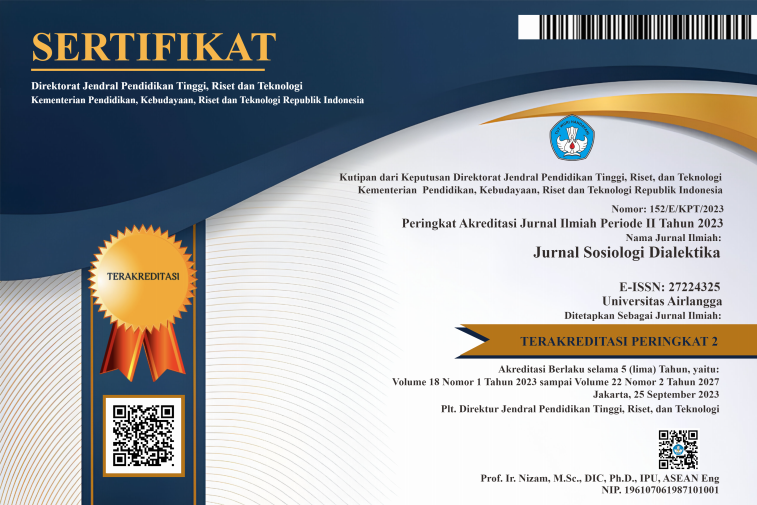Social discourse in the power of distance learning implementation during the Covid-19 pandemic
Downloads
The Covid-19 pandemic has had an impact on various sectors including changes in the learning process in schools. As an important component in education, teachers have a role in supporting teaching and learning activities during the Covid-19 pandemic. However, teachers in implementing distance learning face obstacles in the form of unpreparedness to adapt to the technology used. This problem is also experienced by teachers at SDN Jajar Tunggal 1 Surabaya, so teachers must force themselves to continue learning using technology. This study aims to determine the discourse created in the implementation of distance learning. The method used in this study is a qualitative research method with Michael Foucault's genealogical approach, and the determination of informants is carried out purposively. The results of this study are teachers have different discourses in seeing the implementation of distance learning. The implementation of distance learning using Microsoft Office 365 is used as a form of discipline for teachers. The use of technology makes it easier for schools and related agencies to evaluate teachers by standardizing the ability of teachers to apply technology. This study concludes that teachers have different discourses in the implementation of distance learning which are influenced by the knowledge of each teacher.
Aprilia V & Jacky M (2019) Relasi kuasa dan CCTV di sekolah menengah atas negeri di Bojonegoro. Jurnal Paradigma 7 (4):1-6.
Apriliyadi EK & Hendrix T (2021) Kajian fenomena pandemi covid-19 di Indonesia: Perspektif wacana, pengetahuan dan kekuasaan Foucault. Jurnal Indonesia Maju 1 (1):28-48.
Apriyanto A (2019) Manajemen pembinaan kedisiplinan siswa: Studi kasus pada absensi fingerprint berbasis SMS Gateway di SMK NU Kaplongan Indramayu. Gema Wiralodra 10 (1):79-92.
Asmuni A (2020) Problematika pembelajaran daring di masa pandemi covid-19 dan solusi pemecahannya. Journal Pedagogy 7 (4):281-288.
Atsani KHL GMZ (2020) Transformasi media pembelajaran pada masa pandemi covid-19. Al Hikmah Jurnal Studi Islam 1 (1):82-93.
Billah A & Yazid M (2020) Developing an android-based learning media on human auditory system for junior high school students. Journal of Physics: Conference Serie. 6th International Conference on Mathematics, Science, and Education (ICMSE 2019) 9-10 October 2019, Semarang, Indonesia.
Blume C (2020) German teachers' digital habitus and their pandemic pedagogy. Postdigital Science and Education 2:879-905.
Foucault M (1966) Les Mots et Les Choses. Paris: Tell Gerrimard.
Haryanto A & Billah A (2020) Establishing an android-based integrated sciences glossary for junior high school students. Journal of Physics: Conference Series. 6th International Conference on Mathematics, Science, and Education (ICMSE 2019) 9-10 October 2019, Semarang, Indonesia.
Jardine GM (2005) Foucault and Education. New York: Peter Lang Publishing.
Kemdikbud (2020a) Buku Saku Panduan Pembelajaran di Masa Pandemi Covid-19. Jakarta: Kementerian
Pendidikan dan Kebudayaan. https://www.kemdikbud.go.id/main/blog/2020/06/buku-saku-panduan-pembelajaran-di-masa-pandemi-covid19.
Kemdikbud (2020b) Pemerintah daerah diberikan kewenangan penuh tentukan izin pembelajaran tatap muka. Kementerian Pendidikan dan Kebudayaan, 20 November. [Accessed 21 December 2021]. https://www.kemdikbud.go.id/main/blog/2020/11/pemerintah-daerah-diberikan-kewenangan-penuh-tentukan-izin-pembelajaran-tatap-muka.
Kraft MA, Simon NS, & Lyon MA (2021) Sustaining a sense of success: The protective role of teacher working conditions during the covid-19 pandemic. Journal of Research on Educational Effectiveness 14 (4).
Kuntarto E (2017) Keefektifan model pembelajaran daring dalam perkuliahan bahasa Indonesia di perguruan tinggi. Indonesian Language Education and Literature 3 (1):99-110.
Lestari PAS & Gunawan G (2020) The impact of covid-19 pandemic on learning implementation of primary and secondary school levels. Indonesian Journal of Elementary and Childhood Education 1(2):58-63.
Liasidou A (2010) Unequal power relations and inclusive education policy making: A discursive analytic approach. Educational Policy 25 (6):887-907.
Martono N (2014a) Sosiologi Pendidikan Michael Foucoult. Jakarta: Rajawali Grafindo Persada.
Martono N (2014b) Dominasi kekuasaan dalam pendidikan: Teori Bordieu dan Foucault. Jurnal Interaksi
(1):28-39.
Nissa SF & Haryanto A (2020) Implementasi pembelajaran tatap muka di masa pandemi covid-19. JURNAL IKA PGSD 8 (2):402-409.
Oliver P (2010) Foucault - The Key Ideas. United States: Teach Yourself.
Permana J & Syarifah LS (2021) Bagaimana pembelajaran daring ditinjau dari perspektif merdeka belajar pada masa covid 19: Berdasarkan pendekatan sistem. Jurnal At-Tadbir: Media Hukum dan Pendidikan 31 (1):161-177.
Putri Z (2021) Survei Kemdikbud: Siswa sulit pahami pelajaran saat belajar jarak jauh. Detiknews, 26 July. [Accesses 21 August 2021]. https://news.detik.com/berita/d-5108510/survei-kemdikbud-siswa-sulit-pahami-pelajaran-saat-belajar-jarak-jauh.
Rahmawati ER & Budirahayu T (2021) Teachers as a panopticon for smart class students during distance learning. Jurnal Sosiologi Dialektika 16 (2):97-107.
Sakti G & Sulung N (2020) Analisis pembelajaran di masa pandemi covid-19. Jurnal Endurance: Kajian Ilmiah Problema Kesehatan 5 (3):496-513.
Saat S (2015) Faktor-faktor determinan dalam pendidikan (studi tentang makna dan kedudukannya dalam pendidikan). Jurnal Al-Ta'dib 8 (2):1-17.
Saraswati BD (2020) Gawat! Hasil riset UGM: Banyak siswa bosan dengan belajar online. Harian Jogja, 06 August. [Accessed 15 May 2021]. https://jogjapolitan.harianjogja.com/read/2020/08/06/510/1046394/gawat-hasil-riset-ugm-banyak-siswa-bosan-dengan-belajar-online.
Tanuwijaya NS & Tambunan W (2021) Alternatif solusi model pembelajaran untuk mengatasi resiko penurunan capaian belajar dalam pembelajaran tatap muka terbatas di masa pandemic covid 19 (studi kasus analisis kebijakan pendidikan). Jurnal Manajemen Pendidikan 10 (2):80-90.
Walshaw M (2007) Working with Foucault in Education. Rotterdam: Sense Publisher.
1. Copyright of this journal is possession of Editorial Board and Journal Manager, by the knowledge of author, whilst the moral right of the publication belongs to the author.
2. Legal formal aspect of journal publication accessibility refers to Creative Commons Attribution-NonCommercial-ShareAlike (CC BY-NC-SA), implies that publication can be used for non-commercial purposes in its original form (cannot be modified).
3. Every publications (printed/electronic) are open access for educational purposes, research, and library. Other that the aims mentioned above, editorial board is not responsible for copyright violation.















